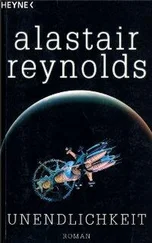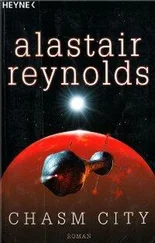‘What’s going on?’
‘Don’t know,’ Sunday said, as if it really wasn’t that interesting.
But Geoffrey couldn’t stop rubbernecking. He’d seldom witnessed anything resembling civil disobedience. In the Surveilled World, it hardly ever reached the point where anyone was in a position to resist authority. That man would have been on the floor by now, dropped into quivering, slack-jawed compliance by the Mech’s direct neural intervention.
Now one of the officials was holding the man’s head in a tight double-handed grip while another shone a pen-sized device into his right eye. Words were exchanged. The man appeared to give up his fight and was soon being bundled back to the tram.
‘His eyes should have stopped recording when he crossed the border,’ Jitendra said. ‘Yours will have, unless you went to great lengths to get around that limitation.’
‘I didn’t,’ Geoffrey assured him.
‘He must have had additional recording devices installed, hoping they wouldn’t get picked up by our normal scans,’ Jitendra speculated. ‘Very naughty. He’s lucky to get off with simple deportation. They’d have been well within their rights to scoop his eyes out on the spot.’
‘We’re kind of touchy about privacy here,’ Sunday said.
‘I see.’
The display of force had left Geoffrey rattled. He’d made no conscious efforts to break the Descrutinised Zone’s protocols, but what if that man had made an innocent mistake, forgetting about some function he’d had installed into his eyes years ago? The additional aug faculties that the clinic in Luanda had given Geoffrey… they couldn’t possibly be mistaken for anything in direct contravention of Zone regulations… could they? But with an effort of will he forced himself to stop worrying. He was in the Zone now. By its very nature, the amount of scrutiny he’d be subjected to from this point on would be minimal.
They left the tram station, part of a loose, straggling procession of travellers and greeters and robots. Sunday must have caught him craning his neck, looking for a view beyond these concrete and spray-sealed warrens. ‘No one bothers much with windows on the Moon,’ she told him. ‘Even above the ’lith. Too depressing at night – weeks of endless darkness – and too bright by day. You want to see Earth, or the stars, take a surface rover or suit, or ching your way to the far side. We came here for the social possibilities, not the scenery. You want scenery, stay in orbit, or go to Mars. That’s not what the Moon’s for .’
‘I didn’t know the Moon was for anything,’ Geoffrey said.
‘It’s a platform, that’s all. An event-space. A place to do interesting stuff. Think they’d tolerate the Zone anywhere else?’ Sunday was off on one of her rants now. ‘Sure, there are blind spots elsewhere in the system, but mostly that’s just because coverage gets patchy, not because people made it that way. This was on Earth, they’d have dragged some ancient clause out of the woodwork and sent in the tanks by now.’
‘I think they’d listen to reasoned persuasion first,’ Geoffrey said. ‘It’s not all tanks and guns down there – we do have something resembling peaceful global civilisation most of the time.’ Typical: he’d only been in Sunday’s presence for ten minutes and he was already acting like the defence counsel for the entire planet. ‘Were you born here, Jitendra?’ he asked brightly.
‘On the other side, Copernicus. That’s where you came in, isn’t it?’
‘Yes, although I didn’t see too much of it.’ They were walking along a level tunnel lined with concrete, the concrete overpainted with an impasto of oozing, flickering psycho-reactive graffiti. ‘Sunday told me you work in robotics.’
‘True-ish,’Jitendra said. ‘Although at the more experimental bleeding edge of things. Something you’re interested in?’
‘I guess. Maybe. Doing some work on elephant cognition.’
Jitendra slapped his forehead absent-mindedly. ‘Oh, I get it now. You’re the elephant man!’
Geoffrey grimaced. ‘You make it sound like I’m some bizarre medical specimen, pickled in a bottle somewhere.’
‘I don’t know how many times I’ve told Jitendra what you do,’ Sunday said, with an exasperated air. ‘I mean, it’s not like I was talking about some obscure second cousin twice removed or anything.’
Around them the graffiti reconfigured itself endlessly, except for mouse-grey patches where the paint had failed or scabbed off. Graffiti was very quaint, Geoffrey thought.
‘So, anyway: elephant cognition,’Jitendra said decisively. ‘That sounds pretty interesting. Where do you stand on Bayesian methods and the free-energy principle?’
‘If it’s free, I’m all for it.’
‘Not really a theoretician, our Geoffrey,’ Sunday said. ‘At least, theoreticians don’t usually make a point of smelling like elephant dung, or flying around in two-hundred-year-old deathtraps.’
‘Thanks.’
She wrapped an arm around his waist. ‘Wouldn’t want him any other way, of course. If it wasn’t for my brother, I’d feel like the only weird member of the family.’
She came to a stop next to a patch of wall where the muddy brown background coloration of earlier graffiti layers had been overpainted with a trembling, shimmering silvery form, like the reflection in water of some complex metallic structure or alien hieroglyph. Blocks and forms of primary colours were beginning to intrude on the silver, jabbing and harassing its margins.
Sunday pushed her finger against the wall and started reasserting the form, pushing it back out against the confining shapes. Where her finger pressed, the silver turned broad and bright and lustrous. ‘This is one of mine,’ she said. ‘Did it five months ago and it’s still hanging on. Not bad for a piece of consensus art. The paint tracks attention. Any piece that doesn’t get looked at often enough, it’s at the mercy of being encroached on and overpainted.’
She pulled back her finger, which remained spotless. ‘I can redo my own work, provided the paint deems itself to have been sufficiently observed . And I can overpaint someone else’s if it hasn’t been looked at enough. I’d hardly ever do that, though – it’s not really fair.’
‘So this is Sunday Akinya, literally making her mark,’ Geoffrey said.
‘I don’t sign this stuff,’ Sunday said. ‘And since I mostly work in sculpture and animation these days, there’s not much chance of anyone associating a piece of two-D abstraction with me.’
Geoffrey stood back to allow a luggage-laden robot to speed past.
‘Anyone could’ve seen you do it.’
‘Most wouldn’t have a clue who I am. I’m a small fish, even up here.’
‘She really is a struggling artist,’ Jitendra said.
‘And half the people who live here are artists anyway, or think they are,’ Sunday said, ushering them on again. ‘I’m not an Akinya here, just another woman trying to make a living.’
As they approached the end of the graffiti-covered corridor, Geoffrey sensed that it was about to open out into a much larger space, the acoustics shifting, the feeling of confinement ebbing. There was even a hint of a breeze.
They emerged high up on one side of a vast flat-roofed cavern. Easily two kilometres across, Geoffrey guessed. Bright lights gridded the slightly domed ceiling, drenching the entire cavern with what appeared to be a simulacrum of full planetary daylight.
Buildings crammed the space, tight as a box of skittles. Many of them reached all the way up to the ceiling and some even punched through. Towers and cupolas and spires, spiralling flutes and teetering top-heavy helices, baroque crystalline eruptions and unsettling brainlike masses, and everything shimmering with eyeball-popping colour, hues and patterns that flickered and shifted from moment to moment, as if the city was some kind of ancient computer system locked in an endless manic cycle of crash and reboot. The lower parts of the buildings, where they were accessible from street level or elevated walkways, were gaudy with layers of psycho-reactive graffiti. The upper levels carried active banners and flags or daubs of fluid, oozing neon, alongside tethered balloons with illuminated flanks.
Читать дальше












